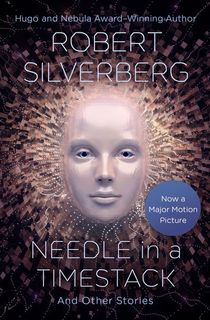In Robert Silverberg’s short story “Needle in a Timestack,” people have grown accustomed to the “little inconveniences of modern life.” These accepted inconveniences are euphemistically called “phasings”—an instant rearranging of one’s past and present due to time tourism.
This passage explains phasings well:
“In the old days, when time was just a linear flow from then to now, did anyone get bored with all that stability? For better or for worse it was different now. You go to bed a Dartmouth man and wake up Columbia, never the wiser. You board a plane that blows up over Cyprus, but then your insurance agent goes back and gets you to miss the flight. In the new fluid way of life there was always a second chance, a third, a fourth, now that the past was open to anyone with the price of a ticket.”
Silverberg doesn’t use this premise to depict high-stakes military sci-fi operations or international intrigue, although the concept arguably lends itself to that scope.
Instead, Needle in a Timestack is a bittersweet story about one husband’s devotion to his wife, and his determination to remember her even when a figure from their past pulls them apart through repeated phasings. This dilemma is reminiscent of the modern inconveniences many couples face in 2021, when quarantine, capitalism, and technology have combined to normalize isolation and minimize intimacy.
RELATED: Read an Excerpt from "Needle in a Timestack" Right Now
Mikkelsen and Janine are a happily-married 2020s couple with two children and at least one cat—the number of pets changes based on phasings. The greatest source of conflict in their relationship is Janine’s ex-husband, Tommy.
Without Tommy, Janine and Mikkelsen would never have met. However, Tommy is determined to strategically alter the past to create a present in which he and Janine are married.
These repeated phasings cost Mikkelsen his friends, several months of newlywed bliss with Janine, and more. But he’s determined to remember Janine, even if Tommy successfully erases the marriage.
For the first few hours after a phasing, those impacted have a fuzzy memory of their former life. For instance, Mikkelsen contacts his best friend after a phasing, but by the time the two speak, both men only know they were once intimately connected.
“This has been one hell of a phasing, hasn’t it?” says Mikkelsen’s friend Gus, upon learning that his longest friendship—and his wife—have disappeared.
This phasing hangover, in which those impacted distantly remember their lives from before, raises questions about inevitability and desire. If Mikkelsen and Janine can’t remember each other for long enough to grieve, what have they truly lost? And can there be such a thing as fate when time is fluid?
These compelling themes are also explored in a new movie adaptation of Silverberg’s short story. Needle in a Timestack (the movie) releases on VOD and in theaters on October 15th.
The film was written and directed by 12 Years a Slave helmer John Ridley, who explained in an interview with the Milwaukee Journal Sentinel that he was drawn to the soft sci-fi of Silverberg’s story:
"It didn’t try to explain (time travel), it didn’t try to explain love, it just treated these two forces as forces of nature [...] In some ways, it was just incredibly simple, it was in other ways incredibly complex. I just loved everything about it [...] I love science fiction. I appreciate the pictures where there's a lot of 'zoom' or flashing lights … and lasers and all that. But I really appreciate the maturity of Mr. Silverberg's storytelling, and it really was about adults questioning love and relationships."
Ridley said the adaptation is as faithful as possible to the original material, while also depicting an inclusive near-future: "For me, it was very important to tell a story that was grounded, (to) tell a story that was about choices, and about regrets, and about the past that is led by a BIPOC (Black, Indigenous and people of color) cast that you don't normally, … or certainly not often enough, get to see making very mature films about very regular human attributes.”
You can watch a trailer for Ridley’s adaptation below.
The film adaptation stars Leslie Odom Jr. as Mikkelsen, Cynthia Erivo as Janine, Orlando Bloom as Tommy, and Freida Pinto as a character whose name has not yet been revealed.
Download the original short story today, then catch the film—before someone phases you into oblivion first.
This post is sponsored by Open Road Media. Thank you for supporting our partners, who make it possible for The Portalist to celebrate the sci-fi and fantasy stories you love.

